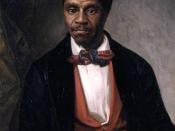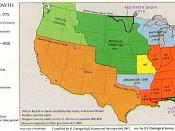Dred Scott v. Sanford is a popular case in United States History. It set precedence for the 13th, 14th, and 15th amendments, the amendments that solely relates to African Americans. Dred Scott, a slave in 1857 declared his right to be free under the Supreme Court. In 1839 Scott and his master moved to Missouri, which was a slave state. Four years later, a U.S. army surgeon named Dr. John Emerson bought Scott and moved him into the free state of Illinois. In 1836, Scott and Emerson moved to Wisconsin Territory. Due to the Missouri Compromise, slavery was prohibited in this area. Emerson died in 1843 and gave everything to his widow Irene including Scott and his family. Scott now wanted to work toward his freedom because he argued that he was taken away from the free state of Illinois against his will. The court ruled against Scott saying he was unable to rule under the court because he's an African American.
He ultimately lost his case in a 7 to 2 ruling.
If African Americans were U.S. citizens, then they must have all of the rights of other citizens, including the right to sue in a federal court. Therefore, the first question before the court involved the Constitution's definition of a citizen. The second question before the Court involved the kinds of limits the Constitution puts on laws about property. If slaves were property, then Congress faced the same limits when it made a law about slavery as when it made a law about property.
The court argued that Scott was not a "Citizen" because slaves were considered property and could not rule under the federal court. According to the Court, the drafters of the Construction had viewed all African Americans as "beings of an inferior order, and altogether...


